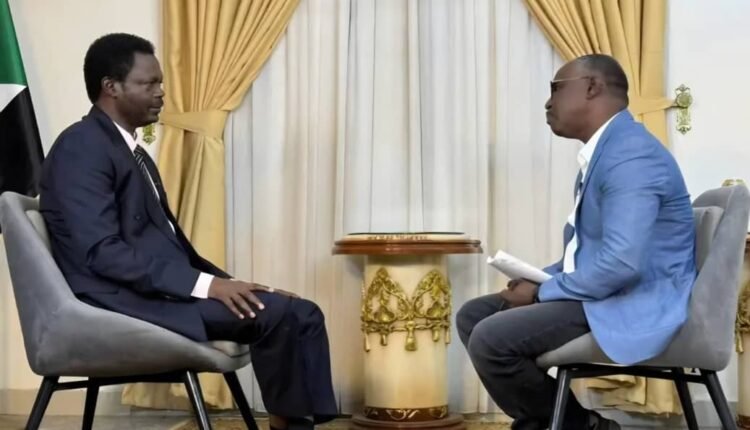Darfur Governor:The situation in El Fasher is catastrophic, and the UAE is responsible for the worsening situation.

BBC – Mohamed Mohamed Osman
The Governor of Sudan’s Darfur region, Minni Arko Minawi, has described the security situation in El Fasher, North Darfur state, as catastrophic, with famine spreading among the besieged civilian population.
In an interview with the BBC from Port Sudan, he accused the Rapid Support Forces of what he described as systematic targeting of the city’s residents and infrastructure, noting that it has been under siege and bombardment for more than a year.
Unequal Opportunities
El Fasher, the last stronghold of the Sudanese army in Darfur, is hosting hundreds of thousands of civilians, mostly women and children, living in extremely difficult humanitarian conditions amid ongoing military operations between the army and allied factions on the one hand, and the paramilitary Rapid Support Forces on the other.
The Rapid Support Forces are seeking to control this strategic city, a major commercial and economic center in the region and located at a crossroads leading to the borders with Libya and Chad.
However, Minawi, who heads the Sudan Liberation Movement, which is fighting alongside the army against the Rapid Support Forces, blamed the international community for the situation in El Fasher.
“They are claiming that the Rapid Support Forces are refusing to allow aid in. They should speak directly with the United Arab Emirates, which provides support to the Rapid Support Forces. The army is waging an unequal battle with a party that owns oil and gas and provides all military equipment to the Rapid Support Forces, including air defense systems that shoot down aircraft in the skies over El Fasher.”
Colonial Ambitions
Last month, the Quartet—comprising the United Arab Emirates, Saudi Arabia, the United States, and Egypt—proposed a roadmap for resolving the Sudanese crisis.
The plan includes a three-month humanitarian truce, followed by a long-term ceasefire. A political process will then begin, excluding the Rapid Support Forces and the army, with the participation of political and civilian forces, with the goal of restoring democracy.
While the Rapid Support Forces welcomed the roadmap, the army commander expressed reservations about it. However, he later reaffirmed his belief that it was “one of the international frameworks that could contribute to stopping the war,” following his meeting with Egyptian Foreign Minister Badr Abdel Atyi in Port Sudan in early October.
When Minawi was asked during the interview about his opinion on the roadmap proposed by the Quartet, he did not answer directly, but he expressed clear objection to Abu Dhabi’s mediation in the Sudanese crisis.
“The UAE cannot ignite a war and then come to mediate to stop it. This is illogical. Even if it agreed to enter the peace process, it wants to impose its colonial conditions, and this is unacceptable.”
Minawi did not stop there, but also expressed his objection to the roadmap submitted by the Sudanese government to the United Nations regarding ending the war and building peace.
“Although we are part of the government, it did not consult us when preparing the roadmap. I object to the clause stipulating that the Rapid Support Forces return to their social base in Darfur, because this step would lead to the division of Sudan.”
Bashir Must Be Handed Over
Minnawi’s forces fought fierce battles against government forces in large parts of the region, prompting Bashir to enlist the help of Arab tribes and Janjaweed militias to defeat the rebels. This was accompanied by widespread abuses against civilians, prompting the International Criminal Court to issue arrest warrants for Bashir and a number of his senior aides on charges of war crimes and genocide in Darfur in 2009.
In early October, the ICC convicted one of the wanted men, Ali Abdel Rahman, known as “Ali Kushayb,” of war crimes and crimes against humanity.
Minnawi welcomed the ruling, believing it contributes to justice for the victims.
When asked about the ICC prosecutor’s request to the Sudanese government to hand over the remaining defendants, Minawi said he supports this request.
“I have always said that the wanted men must be handed over, because the Sudanese judiciary has failed to address this issue, thus the ICC intervened.”
The current Sudanese government is composed of military leaders, headed by Lieutenant General Abdel Fattah al-Burhan, Chairman of the Sovereign Council, armed factions—including Minni Minawi’s faction—that chose to fight alongside the army, and a civilian government headed by Prime Minister Kamil Idris.
However, there is a widespread belief that the government is reluctant to hand over wanted individuals, as evidenced by the fact that Bashir and his aides remain at large and have not been returned to prison after being released following the outbreak of war between the army and the Rapid Support Forces more than two years ago.
The governor of Darfur thinks this interpretation is inaccurate:
“The government is now a government of war and in a transitional period, and its current priority is to crush the rebellion and end the war. The issue of justice is important, but it is not the top priority at this time.”
It is a striking irony that Minawi, who fought for years against the Sudanese army, which was then allied with Arab tribes and the Janjaweed militia, demanding development in Darfur and a share in political power, has now become an ally of the army against the Rapid Support Forces and Arab militias in the war that broke out in April 2023.
He even went further, expressing his willingness to engage in dialogue—along with other political forces—with Bashir’s National Congress Party (NCP) to end the Sudanese crisis.
He justified this by saying:
“I am engaging in dialogue with Bashir’s party because they are part of the Sudanese landscape and society, and I will not accept negotiations with the Rapid Support Forces because they are now fighting us and committing genocide in Darfur and elsewhere.”
Shortlink: https://sudanhorizon.com/?p=8215

